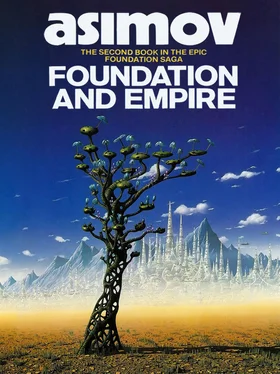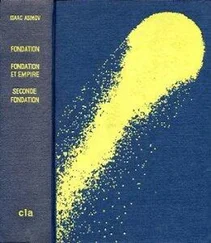Toran said, “Who was it?”
“That captain who was with us so long a time ago, when first you saved me from slavery.”
It had obviously been Magnifico’s intention to create a sensation, and the delighted smile that curled broadly in the shadow of his proboscis, attested to his realization of the intention’s success.
“Captain . . . Han . . . Pritcher?” demanded Mis, sternly. “You’re sure of that? Certain sure now?”
“Sir, I swear,” and he laid a bone-thin hand upon his narrow chest. “I would uphold the truth of it before the Mule and swear it in his teeth, though all his power were behind him to deny it.”
Bayta said in pure wonder, “Then what’s it all about?”
The clown faced her eagerly, “My lady, I have a theory. It came upon me, ready made, as though the Galactic Spirit had gently laid it in my mind.” He actually raised his voice above Toran’s interrupting objection.
“My lady,” he addressed himself exclusively to Bayta, “if this captain had, like us, escaped with a ship; if he, like us, were on a trip for a purpose of his own devising; if he blundered upon us—he would suspect us of following and waylaying him, as we suspect him of the like. What wonder he played this comedy to enter our ship?”
“Why would he want us in his ship, then?” demanded Toran. “That doesn’t fit.”
“Why, yes, it does,” clamored the clown, with a flowing inspiration. “He sent an underling who knew us not, but who described us into his microphone. The listening captain would be struck at my own poor likeness—for, of a truth, there are not many in this great Galaxy who bear a resemblance to my scantiness. I was the proof of the identity of the rest of you.”
“And so he leaves us?”
“What do we know of his mission, and the secrecy thereof? He has spied us out for not an enemy and having it done so, must he needs think it wise to risk his plan by widening the knowledge thereof?”
Bayta said slowly, “Don’t be stubborn, Torie. It does explain things.”
“It could be,” agreed Mis.
Toran seemed helpless in the face of united resistance. Something in the clown’s fluent explanations bothered him. Something was wrong. Yet he was bewildered and, in spite of himself, his anger ebbed.
“For a while,” he whispered, “I thought we might have had one of the Mule’s ships.”
And his eyes were dark with the pain of Haven’s loss.
The others understood.
NEOTRANTOR. . . . The small planet of Delicass, renamed after the Great Sack, was for nearly a century the seat of the last dynasty of the First Empire. It was a shadow world and a shadow Empire and its existence is only of legalistic importance. Under the first of the Neotrantorian dynasty . . .
ENCYCLOPEDIA GALACTICA
Neotrantor was the name! New Trantor! And when you have said the name you have exhausted at a stroke all the resemblances of the new Trantor to the great original. Two parsecs away, the sun of Old Trantor still shone and the Galaxy’s Imperial Capital of the previous century still cut through space in the silent and eternal repetition of its orbit.
Men even inhabited Old Trantor. Not many—a hundred million, perhaps, where fifty years before, forty billions had swarmed. The huge, metal world was in jagged splinters. The towering thrusts of the multitowers from the single world-girdling base were torn and empty—still bearing the original blast-holes and firegut—shards of the Great Sack of forty years earlier.
It was strange that a world which had been the center of a Galaxy for two thousand years—that had ruled limitless space and been home to legislators and rulers whose whims spanned the parsecs—could die in a month. It was strange that a world which had been untouched through the vast conquering sweeps and retreats of a millennia, and equally untouched by the civil wars and palace revolutions of other millennia—should lie dead at last. It was strange that the Glory of the Galaxy should be a rotting corpse.
And pathetic!
For centuries would yet pass before the mighty works of fifty generations of humans would decay past use. Only the declining powers of men, themselves, rendered them useless now.
The millions left after the billions had died tore up the gleaming metal base of the planet and exposed soil that had not felt the touch of sun in a thousand years.
Surrounded by the mechanical perfections of human efforts, encircled by the industrial marvels of mankind freed of the tyranny of environment—they returned to the land. In the huge traffic clearings, wheat and corn grew. In the shadow of the towers, sheep grazed.
But Neotrantor existed—an obscure village of a planet drowned in the shadow of mighty Trantor, until a heart-throttled royal family, racing before the fire and flame of the Great Sack sped to it as its last refuge—and held out there, barely, until the roaring wave of rebellion subsided. There it ruled in ghostly splendor over a cadaverous remnant of Imperium.
Twenty agricultural worlds were a Galactic Empire!
Dagobert IX, ruler of twenty worlds of refractory squires and sullen peasants, was Emperor of the Galaxy, Lord of the Universe.
Dagobert IX had been twenty-five on the bloody day he arrived with his father upon Neotrantor. His eyes and mind were still alive with the glory and the power of the Empire that was. But his son, who might one day be Dagobert X, was born on Neotrantor.
Twenty worlds were all he knew.
Jord Commason’s open air car was the first vehicle of its type on all Neotrantor—and, after all, justly so. It did not end with the fact that Commason was the largest landowner on Neotrantor. It began there. For in earlier days he had been the companion and evil genius of a young crown prince, restive in the dominating grip of a middle-aged emperor. And now he was the companion and still the evil genius of a middle-aged crown prince who hated and dominated an old emperor.
So Jord Commason, in his air car, which in mother-of-pearl finish and gold-and-lumetron ornamentation needed no coat of arms as owner’s identification, surveyed the lands that were his, and the miles of rolling wheat that were his, and the huge threshers and harvesters that were his, and the tenant-farmers and machine-tenders that were his—and considered his problems cautiously.
Beside him, his bent and withered chauffeur guided the ship gently through the upper winds and smiled.
Jord Commason spoke to the wind, the air, and the sky, “You remember what I told you, Inchney?”
Inchney’s thin gray hair wisped lightly in the wind. His gap-toothed smile widened in its thin-lipped fashion and the vertical wrinkles of his cheeks deepened as though he were keeping an eternal secret from himself. The whisper of his voice whistled between his teeth.
“I remember, sire, and I have thought.”
“And what have you thought, Inchney?” There was an impatience about the question.
Inchney remembered that he had been young and handsome, and a lord on Old Trantor. Inchney remembered that he was a disfigured ancient on Neotrantor, who lived by grace of Squire Jord Commason, and paid for the grace by lending his subtlety on request. He sighed very softly.
He whispered again, “Visitors from the Foundation, sire, are a convenient thing to have. Especially, sire, when they come with but a single ship, and but a single fighting man. How welcome they might be.”
“Welcome?” said Commason, gloomily. “Perhaps so. But those men are magicians and may be powerful.”
“ Pugh ,” muttered Inchney, “the mistiness of distance hides the truth. The Foundation is but a world. Its citizens are but men. If you blast them, they die.”
Читать дальше












